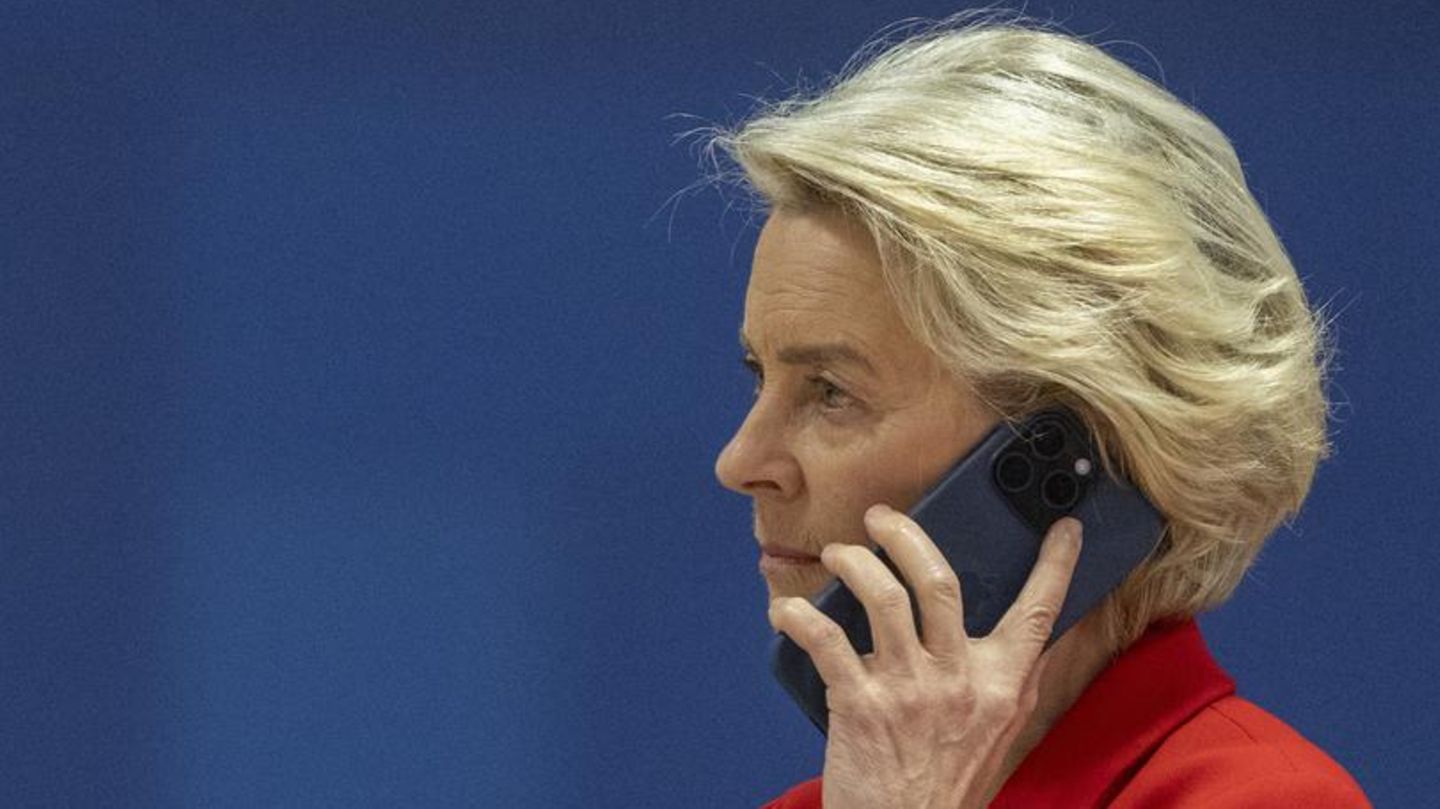Vaccination deal with Pfizer
Where are Ursula von der Leyen’s missing text messages?
Copy the current link
The EU Commission will be in court from this Friday. It’s about a vaccination deal with Pfizer – and untraceable communication between Ursula von der Leyen and the company boss.
To understand why this Friday could be unpleasant for Ursula von der Leyen, you have to jump back to 2021. Europe was hit by the corona pandemic at the time, most countries were in lockdown, the economy was at a standstill. The first vaccination campaigns are actually supposed to start in the EU, but there are delivery bottlenecks. One of the first vaccine producers, AstraZeneca, is experiencing production problems.
The President of the European Commission wants to remedy the situation. The EU is negotiating a deal on behalf of the 27 member states – with the American pharmaceutical company Pfizer. It is set to be the largest order the EU Commission has ever placed: it is ordering 1.8 billion vaccines, enough to vaccinate the entire EU population three times.
The deal with Pfizer is valued at over 35 billion euros, but the EU executive will never reveal the exact price. Hundreds of millions of the vaccines have now been destroyed – they have exceeded their expiration date.
Ursula von der Leyen: Delicate communication with Pfizer via SMS and telephone
Ursula von der Leyen is said to have conducted the negotiations personally. She is said to have communicated with Pfizer boss Albert Bourla by telephone and text messages. This is what he told the “New York Times” a little later. And that is exactly what could be Ursula von der Leyen’s downfall.
This Friday, the EU court in Luxembourg is dealing with the Commission keeping all information about the controversial deal under wraps. The negotiation is not just about the Pfizer business, but also about which documents the EU Commission will have to make public in the future.
Shortly after the controversial Pfizer deal in 2021, journalist Alexander Fanta requested, within the framework of the European Transparency Act, the text messages that the European Commission head is said to have exchanged with the Pfizer boss – without success. The commission denied the journalist access. She argued that text messages were not “official documents” that the Commission had to register and archive, i.e. to which it had to give the public access. The argument was that SMS was too short-lived.
The journalist referred the case to the European Ombudsman and was proven right. The body, which examines complaints against EU authorities, found “maladministration”. The Commission therefore has no right to categorically withhold text messages from the public. Nevertheless, she remained in her position.
Are there new transparency rules coming now?
Fanta contacted the New York Times. And this filed a lawsuit against the European Commission a year ago. She demands access to the text messages. It is this case that is now being heard by fifteen judges of the European Court of Justice.
It’s about more than just the text messages between von der Leyen and Pfizer boss Bourla, said Alexander Fanta star. “It’s also about what the European Commission considers a document and what doesn’t.” Currently, the EU authority would arbitrarily decide which documents to register and which not – and thus also which documents would be available to the public within the framework of the Transparency Act. SMS, but also other forms of communication such as Teams messages or Webex conversations are therefore excluded.
This approach is not compatible with EU laws and the EU Charter of Fundamental Rights. The latter grants citizens access to EU documents “regardless of the form of medium used for these documents”. If the court rules in favor of the plaintiffs, many more documents could become available to the public that the Commission has not yet considered to be “official documents” – a big step towards transparency, says Alexander Fanta.
If the Commission loses in court, it will be forced to take significantly stricter transparency measures. It can then no longer decide for itself what it calls a “document” and thus makes available to citizens, but would have to systematically archive all types of communication, including text messages, from the head of the Commission and her commissioners. For journalists and EU citizens, this means they can request access to a much wider range of documents.
A Belgian lobbyist has also filed a lawsuit
The process will also provide information about whether the infamous text messages between Ursula von der Leyen and Albert Bourla even exist – the EU Commission has so far denied this – and whether they have perhaps been deleted in the meantime. It wouldn’t be the first time that Ursula von der Leyen has come into focus because of missing text messages. In 2020, when a federal committee in Germany examined the awarding of million-dollar consulting contracts for the Ministry of Defense, it requested the work cell phone of former Defense Minister von der Leyen. Only: She had deleted all the text messages on her cell phone.
It is also not the first time that the EU Commission has had to answer for the controversial deal with Pfizer. In 2022, the European Court of Auditors accused the Commission of errors in negotiations with Pfizer. The European Public Prosecutor’s Office EPPO has been investigating the case for two years. And a Belgian court is also looking into the deal: A Belgian lobbyist has also sued for access to the text messages between Ursula von der Leyen and the Pfizer boss. Poland and Hungary have joined the lawsuit. The hearing is scheduled for December 6th.
Source: Stern
I have been working in the news industry for over 6 years, first as a reporter and now as an editor. I have covered politics extensively, and my work has appeared in major newspapers and online news outlets around the world. In addition to my writing, I also contribute regularly to 24 Hours World.






